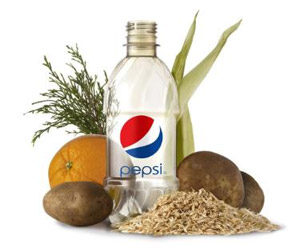PEPSICO
PET bottle made entirely from plant-based resources / Pilot plant in 2012 / Technology differs from Coca-Cola's PlantBottle packaging
 Pepsi's new bottle is 100% recyclable (Photo: PepsiCo) |
Food and beverage conglomerate PepsiCo (Purchase, New York / USA; www.pepsico.com) says it has developed the world’s first PET bottle made entirely from plant-based, fully renewable resources. The bottle, which is 100% recyclable, is based on a selection of bio-based raw materials, including switch grass, pine bark and corn husks. Pilot-scale production of the new bottle will begin in 2012; on successful completion, PepsiCo says it will move directly to full-scale commercialisation.
“This breakthrough innovation is a transformational development for PepsiCo and the beverage industry,” said chairman and CEO Indra Nooyi, “and is a direct result of our commitment to research and development.”
PepsiCo says it has used a combination of biological and chemical processes to identify methods that will create a PET molecular structure that is identical to the petroleum-based polymer. This results in a bottle that looks, feels and protects its product in the same manner as existing PET beverage containers. In addition, as one of the world’s largest food and beverage businesses, PepsiCo is in an ideal position to source agricultural by-products from its food operations, creating a sustainable business model for bottle manufacture. Other material sources are likely to include orange peels, potato peelings and oat hulls.
The raw materials used in PepsiCo’s new bottle contrast with the technology being used by The Coca-Cola Company (Atlanta / USA; www.thecoca-colacompany.com) for its “PlantBottle” packaging, which utilises sugar-based ethanol for the MEG components. Coca-Cola is currently rolling out PlantBottle production in factories around the world, using the material at a 30% level in bottles comprising up to 50% recycled PET – see Plasteurope.com 10.02.2011. It plans to convert all its plastic packaging to the completely biobased PlantBottle by 2020.
“This breakthrough innovation is a transformational development for PepsiCo and the beverage industry,” said chairman and CEO Indra Nooyi, “and is a direct result of our commitment to research and development.”
PepsiCo says it has used a combination of biological and chemical processes to identify methods that will create a PET molecular structure that is identical to the petroleum-based polymer. This results in a bottle that looks, feels and protects its product in the same manner as existing PET beverage containers. In addition, as one of the world’s largest food and beverage businesses, PepsiCo is in an ideal position to source agricultural by-products from its food operations, creating a sustainable business model for bottle manufacture. Other material sources are likely to include orange peels, potato peelings and oat hulls.
The raw materials used in PepsiCo’s new bottle contrast with the technology being used by The Coca-Cola Company (Atlanta / USA; www.thecoca-colacompany.com) for its “PlantBottle” packaging, which utilises sugar-based ethanol for the MEG components. Coca-Cola is currently rolling out PlantBottle production in factories around the world, using the material at a 30% level in bottles comprising up to 50% recycled PET – see Plasteurope.com 10.02.2011. It plans to convert all its plastic packaging to the completely biobased PlantBottle by 2020.
22.03.2011 Plasteurope.com 833 [218948-0]
Published on 22.03.2011
